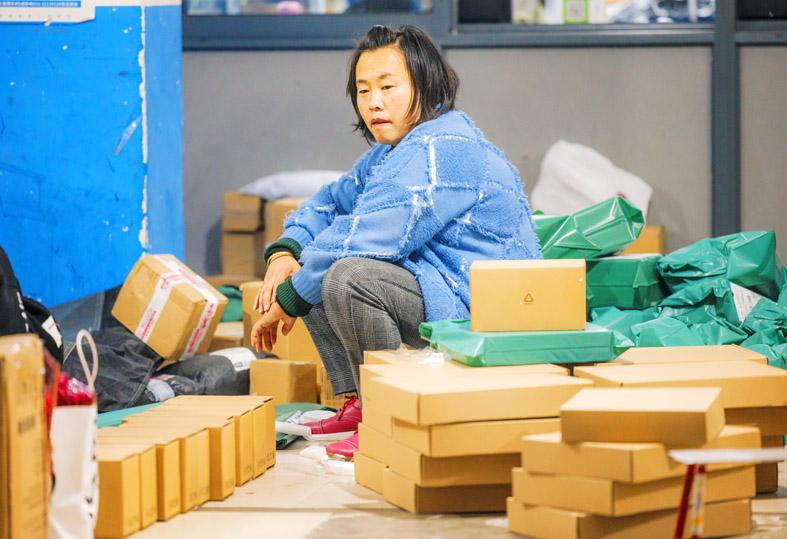After more than a decade of explosive growth, China’s Singles’ Day, the world’s biggest online shopping fest, is losing its gloss and bracing for more modest growth in coming years, hurt by a slower economy and tighter regulatory scrutiny.
E-commerce giant Alibaba Group Holding Ltd (阿里巴巴) yesterday said that its sales — or gross merchandise value (GMV) — during the 11-day event grew just 8.5 percent, the slowest rate ever, underscoring the headwinds for China’s tech firms.
GMV had grown by at least double digits every year since Alibaba founded the festival in 2009 and built it into a global online shopping fest, dwarfing Cyber Monday in the US.

Photo: EPA-EFE
Last year, it extended the one-day event to 11.
However the state-backed Securities Daily newspaper criticized the focus on high turnover from sales for being unsustainable, chaotic and incompatible with China’s new development path.
“The ‘worship of turnover’ is not only unsustainable in terms of digital growth, but is also inextricably linked to chaos,” the newspaper said.
Analysts said that the weak performance also reflected how Chinese consumers have increasingly become weary and wary of the day’s promotions and the quality of service.
Shoppers have also become more cautious about spending due to new COVID-19 outbreaks and supply disruptions that have affected sales and contributed to China’s economy lackluster performance as the country posted its slowest growth in a year last quarter.
“The magic of Double 11 is fading,” said Sharry Wu, Greater China consulting business transformation leader at consulting firm Ernst & Young Global Ltd, referring to the event’s original date. “Brands have to understand after years of practice, Singles’ Day is not their guaranteed sales booster.”
The event has historically been headlined by eye-catching bargains and livestreaming promotions. It is also a big sales boost for companies such as Apple Inc and L’Oreal SA, which each posted sales of more than 100 million yuan (US$15.7 million) over the 11-day event this year.
Alibaba’s dominance of the e-commerce market is also being chipped away at by rivals such as JD.com Inc (京東) and Pinduoduo Inc (拼多多), which have aggressively competed for new shoppers in China’s lower-tier cities.
JD.com, which holds its own 11-day Singles’ Day shopping event, recorded 349.1 billion yuan in sales, up 28.6 percent from the previous year.
Over the past year, regulators have accused Alibaba and its e-commerce rivals of treating their customers poorly by spamming them with promotions, unfairly restricting their choices and allowing merchants to fake discounts, punishing them with fines in some cases.
Under such a specter of regulatory scrutiny, Alibaba toned down the marketing hype this year, doing away with a rolling tally tracking transactions that had taken center stage in previous years and saying that it was focused on sustainability.
Still, Alibaba said a record 290,000 brands and 900 million consumers participated this year, and 78 businesses saw GMV grow more than 10-fold compared with last year to more than 100 million yuan.

SEEKING CLARITY: Washington should not adopt measures that create uncertainties for ‘existing semiconductor investments,’ TSMC said referring to its US$165 billion in the US Taiwan Semiconductor Manufacturing Co (TSMC, 台積電) told the US that any future tariffs on Taiwanese semiconductors could reduce demand for chips and derail its pledge to increase its investment in Arizona. “New import restrictions could jeopardize current US leadership in the competitive technology industry and create uncertainties for many committed semiconductor capital projects in the US, including TSMC Arizona’s significant investment plan in Phoenix,” the chipmaker wrote in a letter to the US Department of Commerce. TSMC issued the warning in response to a solicitation for comments by the department on a possible tariff on semiconductor imports by US President Donald Trump’s

The government has launched a three-pronged strategy to attract local and international talent, aiming to position Taiwan as a new global hub following Nvidia Corp’s announcement that it has chosen Taipei as the site of its Taiwan headquarters. Nvidia cofounder and CEO Jensen Huang (黃仁勳) on Monday last week announced during his keynote speech at the Computex trade show in Taipei that the Nvidia Constellation, the company’s planned Taiwan headquarters, would be located in the Beitou-Shilin Technology Park (北投士林科技園區) in Taipei. Huang’s decision to establish a base in Taiwan is “primarily due to Taiwan’s talent pool and its strength in the semiconductor

An earnings report from semiconductor giant and artificial intelligence (AI) bellwether Nvidia Corp takes center stage for Wall Street this week, as stocks hit a speed bump of worries over US federal deficits driving up Treasury yields. US equities pulled back last week after a torrid rally, as investors turned their attention to tax and spending legislation poised to swell the US government’s US$36 trillion in debt. Long-dated US Treasury yields rose amid the fiscal worries, with the 30-year yield topping 5 percent and hitting its highest level since late 2023. Stocks were dealt another blow on Friday when US President Donald

UNCERTAINTY: Investors remain worried that trade negotiations with Washington could go poorly, given Trump’s inconsistency on tariffs in his second term, experts said The consumer confidence index this month fell for a ninth consecutive month to its lowest level in 13 months, as global trade uncertainties and tariff risks cloud Taiwan’s economic outlook, a survey released yesterday by National Central University found. The biggest decline came from the timing for stock investments, which plunged 11.82 points to 26.82, underscoring bleak investor confidence, it said. “Although the TAIEX reclaimed the 21,000-point mark after the US and China agreed to bury the hatchet for 90 days, investors remain worried that the situation would turn sour later,” said Dachrahn Wu (吳大任), director of the university’s Research Center for